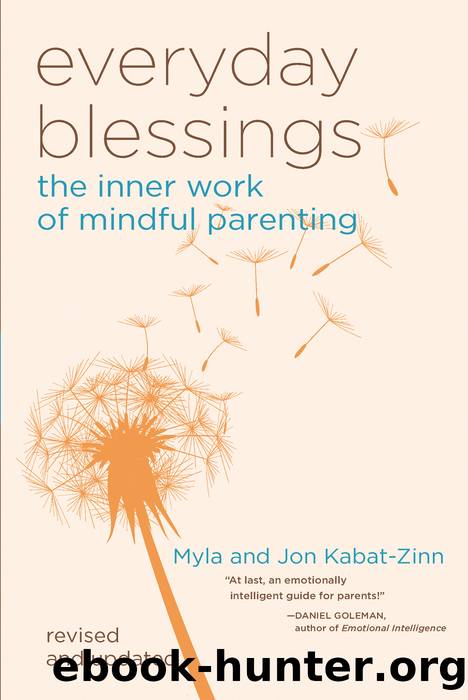Everyday Blessings by Jon Kabat-Zinn

Author:Jon Kabat-Zinn [KABAT-ZINN, MYLA / KABAT-ZINN, JON]
Language: eng
Format: epub
Publisher: Hachette Books
Published: 2009-07-02T00:00:00+00:00
Ridiculous the waste sad time,
Stretching before and after.
T. S. ELIOT,
“BURNT NORTON,” Four Quartets
Presence
“Mom, you’re not listening!”
Despite my seeming presence, I’ve been caught with my mind elsewhere. I’m pulled back for a moment, only to wander off again into creative mental explorations or obsessive, mostly irrelevant thoughts about the past or the future. This happens to all of us, and it happens a lot. Mindfulness is most fundamentally about cultivating moment-to-moment wakeful presence in the face of our wandering minds and seemingly endless impulses to distract ourselves. It is difficult to show up fully, even for a moment, even for ourselves. As we cultivate mindfulness in our parenting, we are intentionally reminding ourselves to be more aware and tuned in rather than tuned out.
Of course, we get lots of opportunities to practice noticing when we’re lost in thought and distracted in one way or another. It’s part of being human. There are always going to be things we want or need to think about. The question is, is this the moment or time to do that? Can we be aware that we are being pulled away from the present moment, and aware of what in particular is pulling us away? Can we see what we might be missing by being so caught up in our thoughts? Awareness gives us a choice, and a chance to come back.
For example, when a child walks in, can we remember to intentionally take a moment and really see her and acknowledge her presence? We do that with acquaintances but we often don’t with those closest to us. It doesn’t always have to be in words, either. Silence can be a profound manifestation of presence when it is embodied.
At the same time, it is important not to misinterpret “being present” to mean that parents should constantly pay attention to their children. This, of course, is neither possible nor desirable. It is essential for our children to have their own experiences. They need to sense from us that we are comfortable with their intrinsic autonomy. Mindful parenting and the cultivation of presence do not mean that we should hover over our children, continually commenting about what they are doing, encouraging them, praising them, or intervening and rescuing them from age-appropriate challenges. It is problematic for them and for us if we lose ourselves in becoming overly child focused.
There is no question that the quality of our presence with our children has a huge effect on the quality of our relationship with them. Cultivating presence requires intentional effort, over and over again coming back to this moment, attending to what is most salient and important, a willingness to be authentic, awake, and attuned.
Being authentic means that we are being genuine. We are not hiding or pretending. We are not discriminating against certain feelings that arise in ourselves or in our children. Rather, with awareness, we can recognize whatever feelings we have, even if they are uncomfortable for us, and metaphorically put out the welcome mat for them. However,
Download
This site does not store any files on its server. We only index and link to content provided by other sites. Please contact the content providers to delete copyright contents if any and email us, we'll remove relevant links or contents immediately.
| Early Childhood | Parenting Boys |
| Parenting Girls | School-Age Children |
| Single Parents | Teenagers |
The Lost Art of Listening by Michael P. Nichols(6474)
Rich Dad Poor Dad by Robert T. Kiyosaki(5150)
We Need to Talk by Celeste Headlee(4871)
I Love You But I Don't Trust You by Mira Kirshenbaum(3229)
The Complete Idiot's Guide to Coping With Difficult People by Arlene Uhl(2822)
Rich Dad Poor Dad: What The Rich Teach Their Kids About Money - That The Poor And Middle Class Do Not! by Robert T. Kiyosaki(2434)
Life Hacks by Dan Marshall(2155)
Dealing with People You Can't Stand by Dr. Rick Brinkman(2061)
A Burst of Light by Audre Lorde(1981)
An Odyssey by Daniel Mendelsohn(1922)
The Expectant Father by Armin A. Brott & Jennifer Ash(1895)
The Book You Wish Your Parents Had Read (and Your Children Will Be Glad That You Did) by Philippa Perry(1873)
Teach Your Child How to Think by Edward De Bono(1865)
The Out-of-Sync Child by Carol Stock Kranowitz(1776)
No Time to Say Goodbye(1760)
What I Need by J. Daniels(1720)
I Don't Belong to You by Keke Palmer(1667)
The Self-Driven Child by William Stixrud PhD & Ned Johnson(1662)
The 7 Habits Of Highly Effective Teens by Covey Sean(1634)
